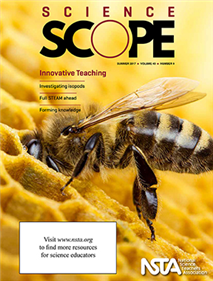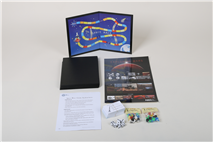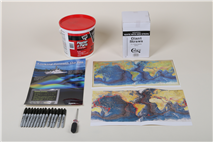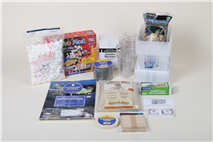All Three-Dimensional Learning resources
Blog Post
You Teach What? I’m So Sorry! Building a Better Body and Building Better Argumentation
I am always amazed at the looks on people’s faces when I tell them I teach middle school. They seem to pity me for having a position I chose and love! They inform me that middle school “tween-agers” are argumentative, stubborn, and at times, ad...
By Cindy Workosky
Blog Post
NGSS Curriculum Integration—Off on a Tangent!
The creation of a school garden inspired this fourth-grade unit. All students in the school were responsible for planning the garden, as well as for planting, weeding, and harvesting our crops of tomatoes, pumpkins, and carrots. The harvest was...
By Cindy Workosky
Journal Article
Teacher's Toolkit: Interactive word walls: Visual Scaffolds That Transform Vocabulary Instruction
This column provides how-to strategies and practical advice for the science teacher. This month’s issue describes how middle school teachers can use interactive word walls to increase their students’ ability to learn and effectively use the langu...
Blog Post
Why Anchoring Phenomena Are Important in the NGSS Classroom
Who is Ivor Robson, and why is he associated with anchoring phenomena? If you are a longtime golf aficionado, you know that Ivor Robson had a special role at the British Open. Robson spent 41 years introducing each player on the first tee, and he nev...
By Cindy Workosky
Blog Post
When I began aligning my instruction to the Next Generation Science Standards (NGSS), I got lost in the details. But when I realized that phenomena could be used to anchor linked disciplinary core ideas, I started to visualize the course as a whole a...
By Cindy Workosky
Blog Post
My ‘Phenomenal’ Journey in Elementary
I am the type of educator who gets very excited about new strategies, new and innovative technology, and new activities for students. However, I was more nervous about than excited about to choosing phenomena for my science units. I felt tremendous p...
By Cindy Workosky
Blog Post
Using the Crosscutting Concepts to Scaffold Student Thinking
At the recent NSTA National Conference in Los Angeles, three-dimensional learning was, of course, a major topic of discussion. When those discussions focus on classroom instruction, though, the crosscutting concepts are often the forgotten dimension....
By Cindy Workosky
Blog Post
At the core of a Next Generation Science Standards (NGSS) classroom is the sequence of exposing students to an interesting natural phenomenon, having students generate questions about the phenomenon, investigating student questions, then creating a s...
By Cindy Workosky
Blog Post
Introducing Crosscutting Concepts in the Elementary Grades
Four years ago, I moved from teaching middle school science to teaching grades 2–5 STEAM (science, technology, engineering, art, and mathematics) labs. One of the biggest challenges I faced was limited lab time in our elementary school. Because we ...
By Cindy Workosky
Blog Post
Planning Three-Dimensional Instruction
Knowing that content material is most engaging when students can relate to it, I always begin my year with a student survey. The questions are designed to help me design lessons to be as student-focused as possible. Knowing my students’ interests a...
By Cindy Workosky
Blog Post
Digging Deeper: Designing Solutions
This month’s Digging Deeper column for the Next Gen Navigator focuses on the practice of constructing explanations and designing solutions, and specifically the design process that addresses the engineering component of the Next Generation Science ...
By Cindy Workosky
Class Pack
Space Exploration ClassPack: Grades 3-5
Using Picture-Perfect STEM Lessons: 3-5: Using Children’s Books to Inspires STEM Learning in your classroom is easier than ever! NSTA’s ClassPacks, each sufficient for a class of 28 students, are lesson-specific collections of materials—an unma...
Class Pack
Solving the Puzzle ClassPack: Grades 3-5
Using Picture-Perfect STEM Lessons: 3-5: Using Children’s Books to Inspires STEM Learning in your classroom is easier than ever! NSTA’s ClassPacks, each sufficient for a class of 28 students, are lesson-specific collections of materials—an unma...
Class Pack
Hurricane ClassPack: Grades 3-5
Using Picture-Perfect STEM Lessons: 3-5: Using Children’s Books to Inspires STEM Learning in your classroom is easier than ever! NSTA’s ClassPacks, each sufficient for a class of 28 students, are lesson-specific collections of materials—an unma...






